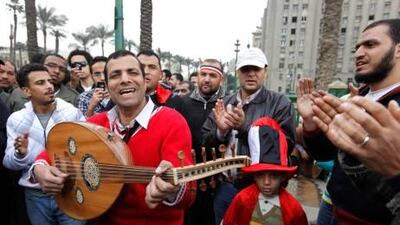CAIRO // Until last month, Ashraf Moh sold communications equipment. Now his job is to sell a movement, even a revolution.
Mr Moh has taken on himself a key role - spokesman to the foreign media for the protesters in Tahrir Square.
While the numbers of protesters in the square have dwindled for the moment as talks between the government and the opposition continue, Mr Moh's determination has not. Neatly dressed and eloquent in English, he continues to drive home a single point to the hundreds of foreign media that have descended on the Egyptian capital.
"On the BBC and CNN, and for the German, English, Italian, Spanish, Polish and even Indian mass media, I am still sending the message that Mubarak must leave," he says.
When not on television, Mr Moh, 23, has fought public relations battles with secret police in his own square. "At night - when many of the journalists had left - I would follow the Mubarak guys. I saw them pose as sympathisers and listened to them trying to convince protesters that they should not continue. After they left, I would go and rally the protesters again."
His role with foreign media has served as a shield. Sitting in a hotel round the corner from the square, he recounts how he was stopped by the military trying to detain him. "I told them I know the foreign press, people will find out that you took me," he says. The officer released him, warning that he "had one last chance".
Mr Moh is keenly aware that while there is power and safety in large numbers of protesters, a popular revolt with vague, if not absent, public leadership is a long-term drawback.
A group of long established opposition figures known as the "Council of Wise Men" meets daily with representatives of the youth-led protest movement. Still, the movement's public face has not galvanised, because of both security concerns and the sheer range of the protest's participants.
At a ramshackle storefront travel agency on the square, though, leaders are emerging, Mr Moh and other well-known protesters insist.
_______________________________
EGYPT'S TWO WEEKS OF TURMOIL
_______________________________
"We are trying to organise ourselves as we speak," says Ahmed Naguib, 33, who also serves as a spokesman for the protesters. "We don't know how wants to serve where and when yet."
Political experience and expertise are not the sole requirements for leadership. "A lot of people have been volunteering day and night for past 10 days and emerged as natural leaders," Mr Naquib saya, adding that the past political and geographic divides have faded in significance.
"There are people from the 6th April, Khaled Said movement. We are also talking to people from the cities that posed a direct threat to the government by putting on mass protests - Alexandria, Suez, Mahalla and other major cities."
Mr Naquib says there are no plans to announce the creation of a new political party until President Hosni Mubarak steps down. However, Mohammed, 23, a blogger who did not want his last name to be used, promises it will happen.
"We will put together a youth political party and elect the candidate for leadership. The next president will be young," he says.

